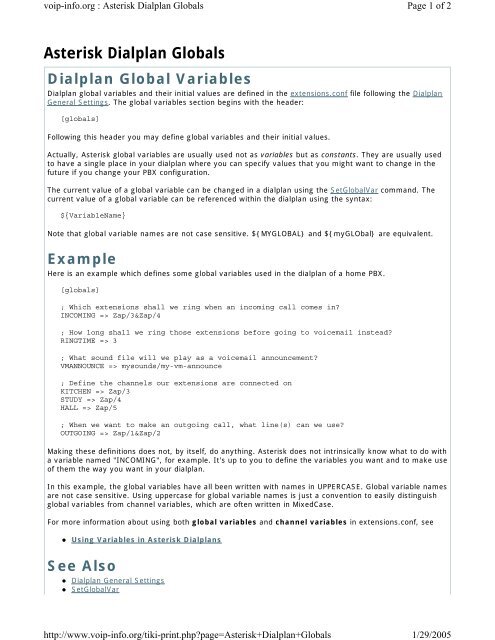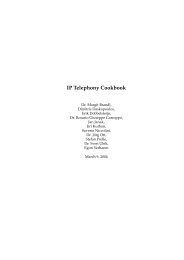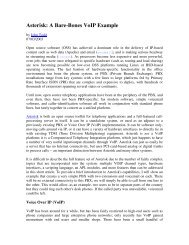Asterisk Dialplan Globals
Asterisk Dialplan Globals
Asterisk Dialplan Globals
You also want an ePaper? Increase the reach of your titles
YUMPU automatically turns print PDFs into web optimized ePapers that Google loves.
voip-info.org : <strong>Asterisk</strong> <strong>Dialplan</strong> <strong>Globals</strong>http://www.voip-info.org/tiki-print.php?page=<strong>Asterisk</strong>+<strong>Dialplan</strong>+<strong>Globals</strong>Page 1 of 21/29/2005<strong>Asterisk</strong> <strong>Dialplan</strong> <strong>Globals</strong><strong>Dialplan</strong> Global Variables<strong>Dialplan</strong> global variables and their initial values are defined in the extensions.conf file following the <strong>Dialplan</strong>General Settings. The global variables section begins with the header:[globals]Following this header you may define global variables and their initial values.Actually, <strong>Asterisk</strong> global variables are usually used not as variables but as constants. They are usually usedto have a single place in your dialplan where you can specify values that you might want to change in thefuture if you change your PBX configuration.The current value of a global variable can be changed in a dialplan using the SetGlobalVar command. Thecurrent value of a global variable can be referenced within the dialplan using the syntax:${VariableName}Note that global variable names are not case sensitive. ${MYGLOBAL} and ${myGLObal} are equivalent.ExampleHere is an example which defines some global variables used in the dialplan of a home PBX.[globals]; Which extensions shall we ring when an incoming call comes in?INCOMING => Zap/3&Zap/4; How long shall we ring those extensions before going to voicemail instead?RINGTIME => 3; What sound file will we play as a voicemail announcement?VMANNOUNCE => mysounds/my-vm-announce; Define the channels our extensions are connected onKITCHEN => Zap/3STUDY => Zap/4HALL => Zap/5; When we want to make an outgoing call, what line(s) can we use?OUTGOING => Zap/1&Zap/2Making these definitions does not, by itself, do anything. <strong>Asterisk</strong> does not intrinsically know what to do witha variable named "INCOMING", for example. It's up to you to define the variables you want and to make useof them the way you want in your dialplan.In this example, the global variables have all been written with names in UPPERCASE. Global variable namesare not case sensitive. Using uppercase for global variable names is just a convention to easily distinguishglobal variables from channel variables, which are often written in MixedCase.For more information about using both global variables and channel variables in extensions.conf, see• Using Variables in <strong>Asterisk</strong> <strong>Dialplan</strong>sSee Also• <strong>Dialplan</strong> General Settings• SetGlobalVar
voip-info.org : <strong>Asterisk</strong> <strong>Dialplan</strong> <strong>Globals</strong>http://www.voip-info.org/tiki-print.php?page=<strong>Asterisk</strong>+<strong>Dialplan</strong>+<strong>Globals</strong>Page 2 of 21/29/2005<strong>Asterisk</strong> | Configuration | The <strong>Dialplan</strong> - extensions.confPlease update this page with new information (you'll have to login first), or without logging in, you can leavea comment on this page -- click on the comment tab above. Thanks! - support@voip-info.orgCreated by: JazEzork last modification: Saturday 05 of June, 2004 [17:11:05 UTC] by JazEzorkSponsored by:














